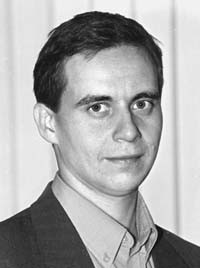A strange impression was made by the visits of Ukrainian Prime Minister Anatoly Kinakh: first he attended the Eurasian economic forum in Almaty and then went to Moscow to meet with Mykhailo Kasianov. Kasianov on behalf of his state proposed Ukraine join the Eurasian Economic Community, having stated that it would be of no economic use for Russia, but it would be desirable in a geopolitical sense. Kommersant magazine commented that Russia is ready to give Ukraine $170 million as a present (what abolition of oil export tax will cost Moscow) if Kyiv becomes Minsk. Responding to this offer Kinakh said that the decision would be made in May taking into account Ukraine’s national interests. Incidentally, as far back as wintertime Ukraine was viewed in Moscow as much more expensive.
The first question to be asked deals neither with the controversies between such formulation of the issue and the declared course toward European integration nor with the effectiveness of a final funeral for GUUAM. The key questions are: What are Ukraine’s interests in this context? Who defines them? How effective are they in strategic perspectives? What can we lose and what can we obtain? The concept of we includes neither the authorities, magnates, their proxies, nor diplomats, but ordinary people, especially those who are not satisfied with Ukraine’s position as an outsider. Recall that for many years Moscow has been persistently trying to make Kyiv join the customs union, which was transformed into the Eurasian community. Kyiv gave a short answer: No. Also let us recall that not so long ago in Odesa President Kuchma signed a declaration of the presidents of Ukraine, Russia, and Moldova, which stated that Ukrainian and Moldovan participation in Eurasian community will have a positive influence on their economic development. The Ukrainian Ministry for Foreign Affairs immediately explained that Ukraine would take part as an observer (though such a position was not provided for in the declaration). Now the Ministry for Foreign Affairs asks us not to come to any hasty conclusion. But there are radically new points, which must be emphasized.
It looks like nowadays Russia is able to make Ukraine an offer it can’t refuse. At least, this proposal will not be turned down easily. Thus Ukraine does need the time-out to make its decision, which might be based on its own conditions. Which, in their turn, could smooth the political consequences. They are not much spoken about today, and one can dispute their very existence. It will result in dependence (in case if the decision to join is passed) in tax, monetary, financial, economic, and transport policy. Thus, Ukraine could finally prove that all more or less important political decisions have been made in Moscow, in particular concerning investment policy. Also in this case Ukraine will have to serve voluntarily or involuntarily the interests of Moscow in security issues, military policy, and so-called geopolitics. Hence these fields will be closed to own decision-making. But nobody will ask any questions about democracy and such while the minimal needed foreign support will be provided. Formal foreign policy should not be limited up to the relations with Eurasian Community territories only – with Russia, Kazakhstan, Kyrgyzstan, Tajikistan, so nobody will forbid having controlled relations with the West and even talking about perspectives of European integration. Those who are deeply interested in falling prices for oil and gas and in abolishing the export tax for metal production will definitely get high profits. If they need some extra exterior markets, the Russians will find them. This is a kind of situation a la Belarus.
Talking about the European vector, we have to say that at first it has to be created. It will be necessary to ensure conditions for a large scale western capital inflow, to ensure the fulfillment of minimally requested demands necessary to start serious and definite conversation. De facto neither European Union nor Ukraine are interested in this conversation today, as the subject is missing. Real reforms, a real start of European policy demands, first of all, serious political will, which has not yet arisen, and the arguments proving that this is the key point to guarantee gradual development makes sense only for intellectuals. Moreover, its loss also endangers them.
Whatever the politicians say, Eurasian patterns adhere to an ideology completely different from being European. The first option will not lead us to any technological, intellectual, and information pace. It will only fix further the growing distance from those who have chosen another way, and this will preserve the inferiority complex as a basic one. The Soviet experience is worth being studied. And simple counting is worth studying as well.







